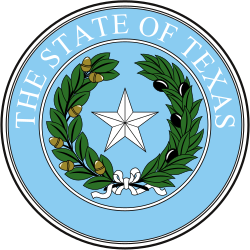| |||||||||||||||||||||
 | |||||||||||||||||||||
| |||||||||||||||||||||
The 1880 Texas gubernatorial election was held to elect the governor of Texas. Governor Oran Milo Roberts was re-elected to a second term in office over former Governor Edmund J. Davis.
November 2, 1880 | |||||||||||||||||||||
| |||||||||||||||||||||
 | |||||||||||||||||||||
| |||||||||||||||||||||
| Elections in Texas |
|---|
 |
The 1880 Texas gubernatorial election was held to elect the governor of Texas. Governor Oran Milo Roberts was re-elected to a second term in office over former Governor Edmund J. Davis.
| Party | Candidate | Votes | % | ±% | |
|---|---|---|---|---|---|
| Democratic | Oran M. Roberts (incumbent) | 166,101 | 62.87% | ||
| Republican | Edmund J. Davis | 64,382 | 24.37% | ||
| Greenback | William H. Hamman | 33,721 | 12.76% | ||
| Total votes | 264,204 | 100.00% | |||